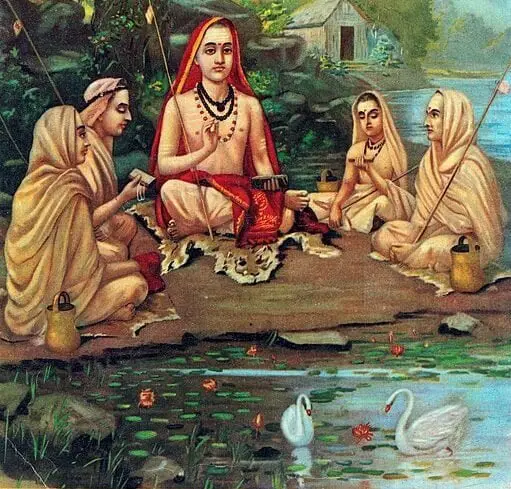Advaita Vedanta is a school of Hindu philosophy that focuses on the concept of non-dualism, or the belief that there is no separation between the individual self (Atman) and the ultimate reality (Brahman). This ancient philosophy has been studied and practiced by yogis and spiritual seekers for thousands of years. In this article, we will delve into the profound teachings of Advaita Vedanta, exploring the essence of this philosophy and discovering the teachings of unity that lie at its core.
The Essence of Advaita Vedanta Unfolds
At its core, Advaita Vedanta is a philosophy that seeks to understand the nature of existence and the nature of the self. The word Advaita means “not two,” and the ultimate goal of this philosophy is to realize the unity between the individual self and the ultimate reality. This realization is seen as the key to achieving spiritual liberation.
The Advaita Vedanta philosophy is based on three foundational texts: the Upanishads, the Bhagavad Gita, and the Brahma Sutras. These texts provide a detailed exploration of the nature of existence, the nature of the self, and the relationship between the two. They also provide a framework for spiritual practice aimed at achieving self-realization.
One of the key teachings of Advaita Vedanta is that reality is ultimately one and that this unity can be realized through the practice of meditation and self-inquiry. The individual self is seen as a manifestation of the ultimate reality, and the goal of spiritual practice is to transcend the limitations of the individual self to realize this ultimate reality.
Another important aspect of Advaita Vedanta is the concept of Maya, or illusion. Maya is seen as the cause of our attachment to the material world and our identification with the individual self. Overcoming Maya is seen as a key step in achieving spiritual liberation.
Advaita Vedanta also emphasizes the importance of the guru-disciple relationship in spiritual practice. The guru is seen as a guide and mentor who can help the disciple navigate the complexities of spiritual practice and achieve self-realization.
Discovering the Profound Teachings of Unity
The teachings of Advaita Vedanta are centered around the concept of unity. The ultimate reality is seen as a single, indivisible entity, and the goal of spiritual practice is to realize this unity. This realization is often described as a merging of the individual self with the ultimate reality, resulting in a state of pure consciousness and bliss.
One of the key teachings of Advaita Vedanta is that the individual self is not separate from the ultimate reality. This concept is often described using the analogy of waves and the ocean. Just as waves are a manifestation of the ocean, the individual self is seen as a manifestation of the ultimate reality. By realizing this unity, we can overcome the limitations of the individual self and achieve spiritual liberation.
Another important aspect of Advaita Vedanta is the concept of the Absolute or Brahman. Brahman is seen as the ultimate reality, beyond all concepts and descriptions. The goal of spiritual practice is to realize this ultimate reality and merge with it.
Advaita Vedanta also emphasizes the importance of self-inquiry in spiritual practice. By questioning our assumptions and beliefs about the nature of the self and reality, we can gain a deeper understanding of our true nature and the nature of existence.
The teachings of Advaita Vedanta also emphasize the importance of compassion and service in spiritual practice. While the ultimate goal is to realize the unity of the self and the ultimate reality, this realization should be accompanied by a deep sense of compassion and a desire to serve others.
Advaita Vedanta is a profound and complex philosophy that has been studied and practiced by yogis and spiritual seekers for thousands of years. Its teachings of unity and self-realization continue to inspire and guide spiritual seekers around the world.
In conclusion, Advaita Vedanta is a philosophy that seeks to understand the nature of existence and the nature of the self. Its teachings of unity and self-realization provide a framework for spiritual practice aimed at achieving spiritual liberation. Through the practice of meditation, self-inquiry, and service, we can come to realize the ultimate reality and transcend the limitations of the individual self.

